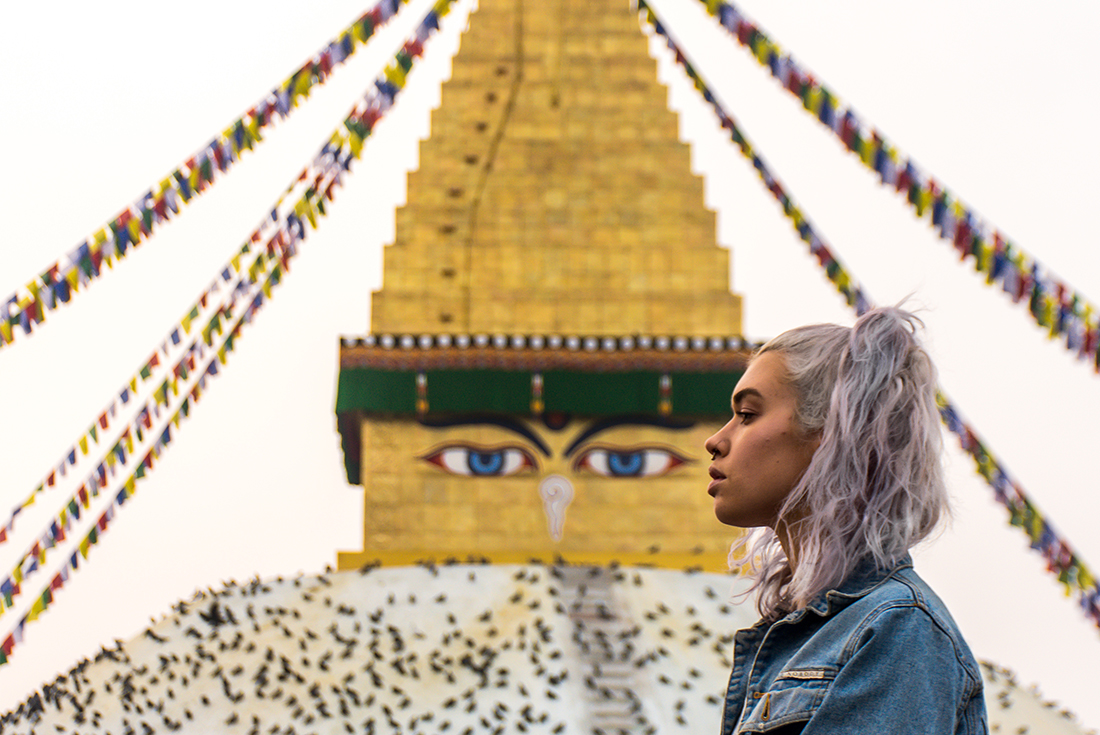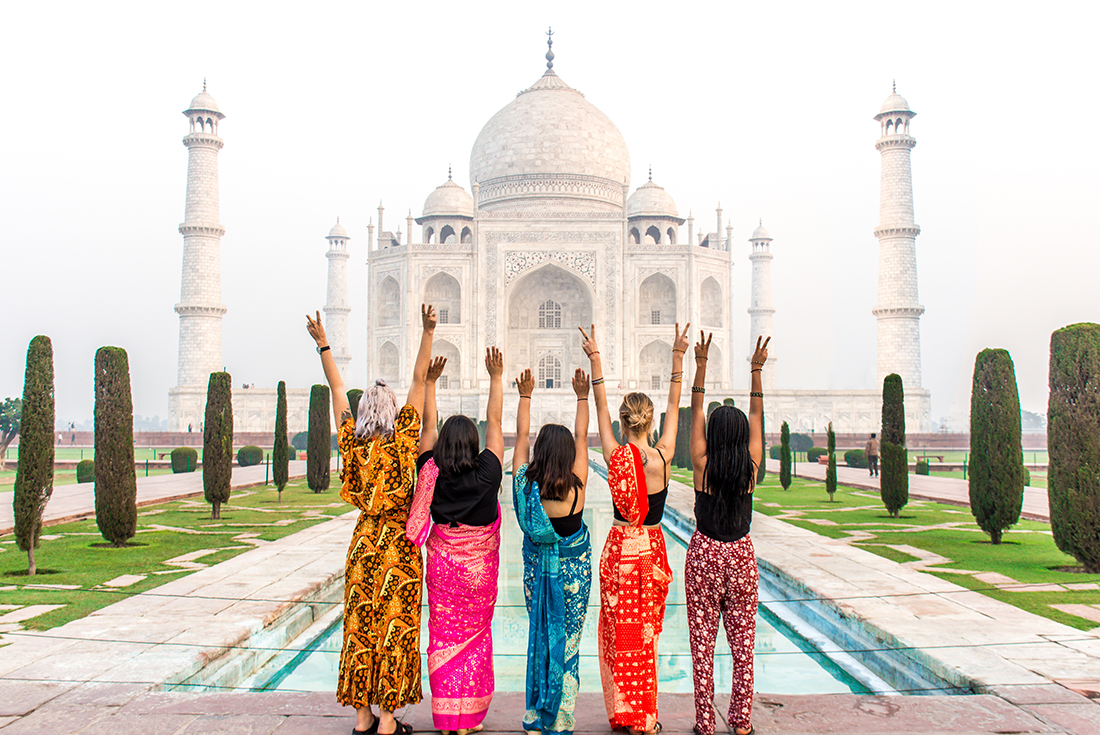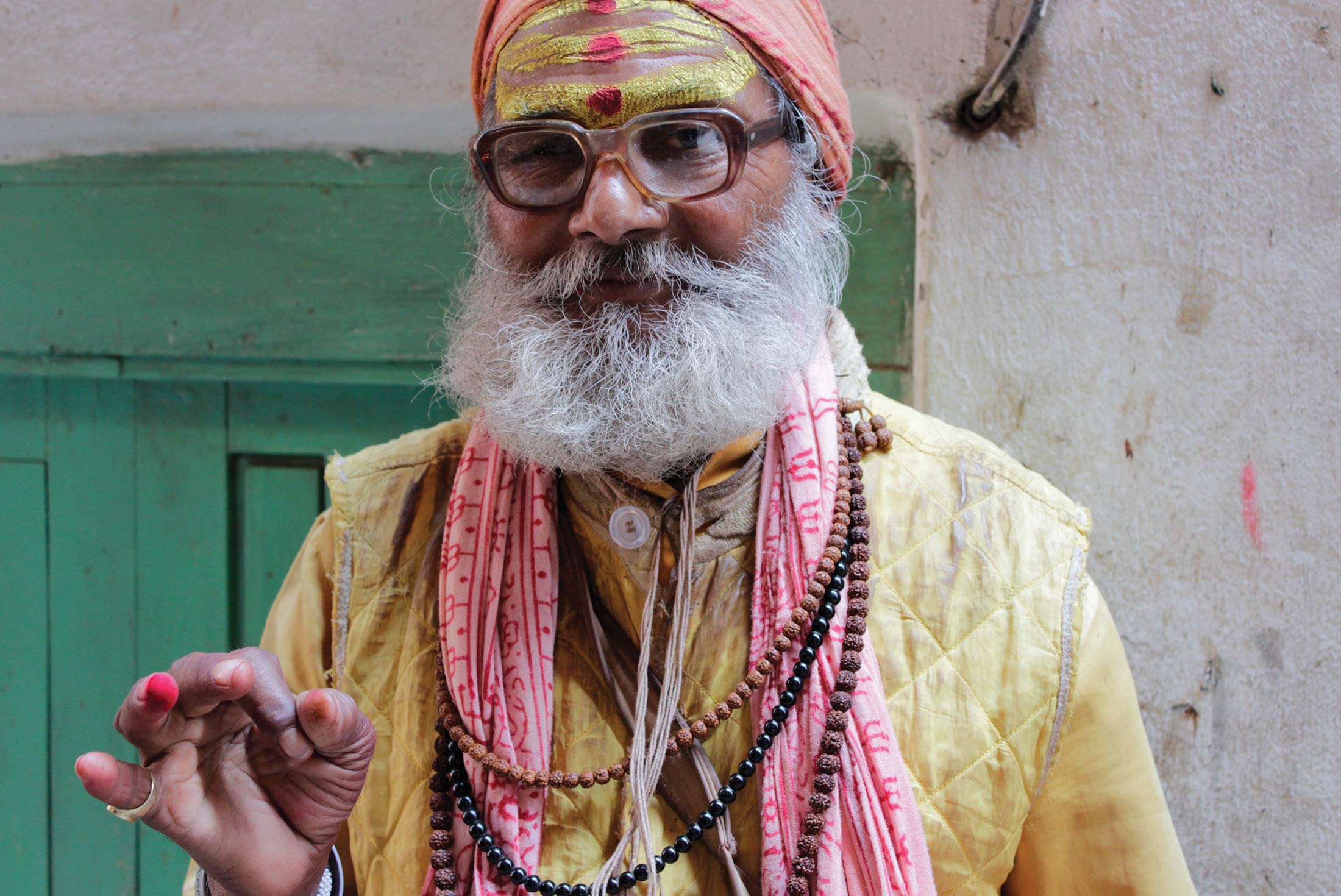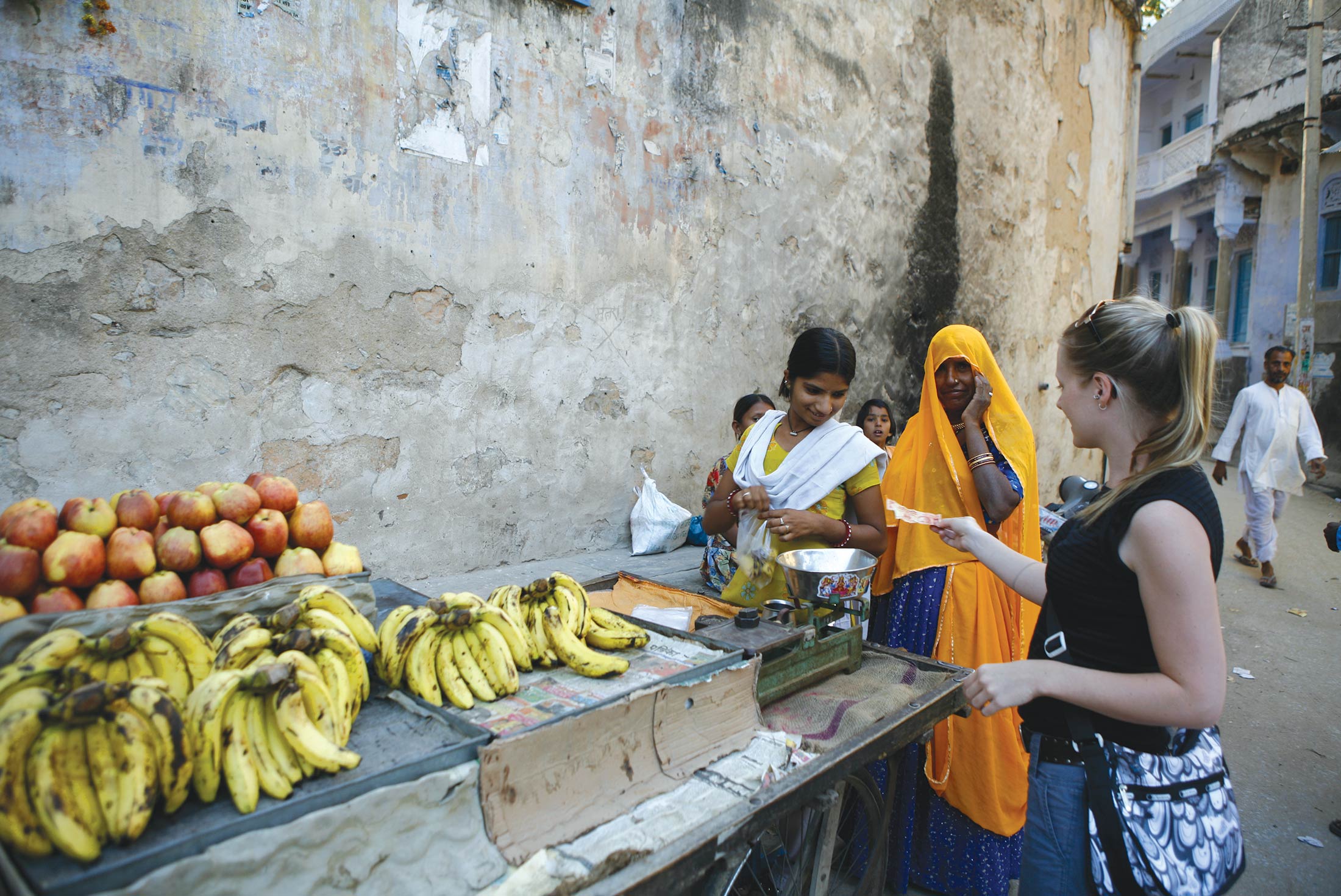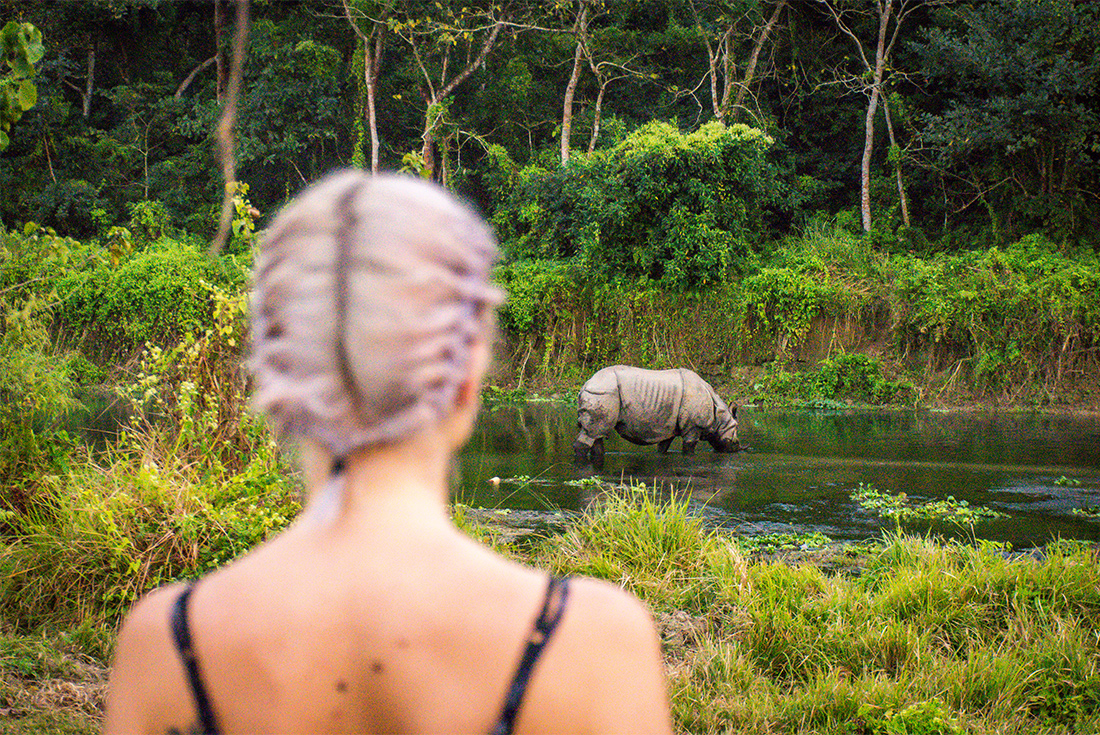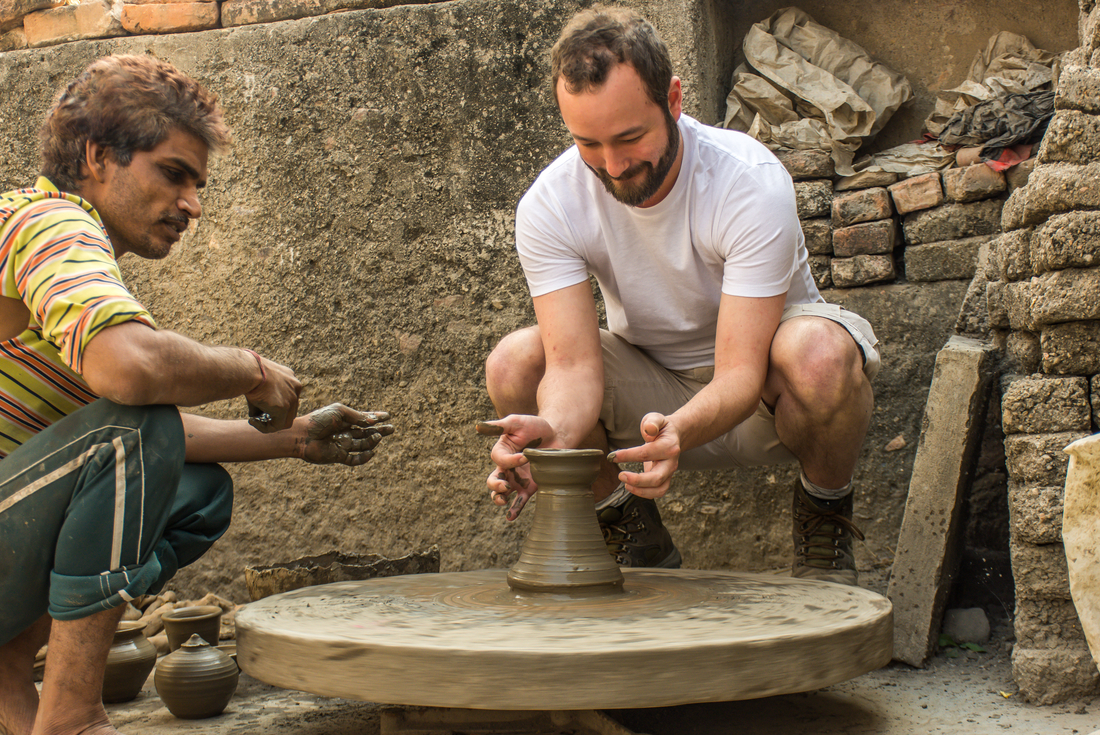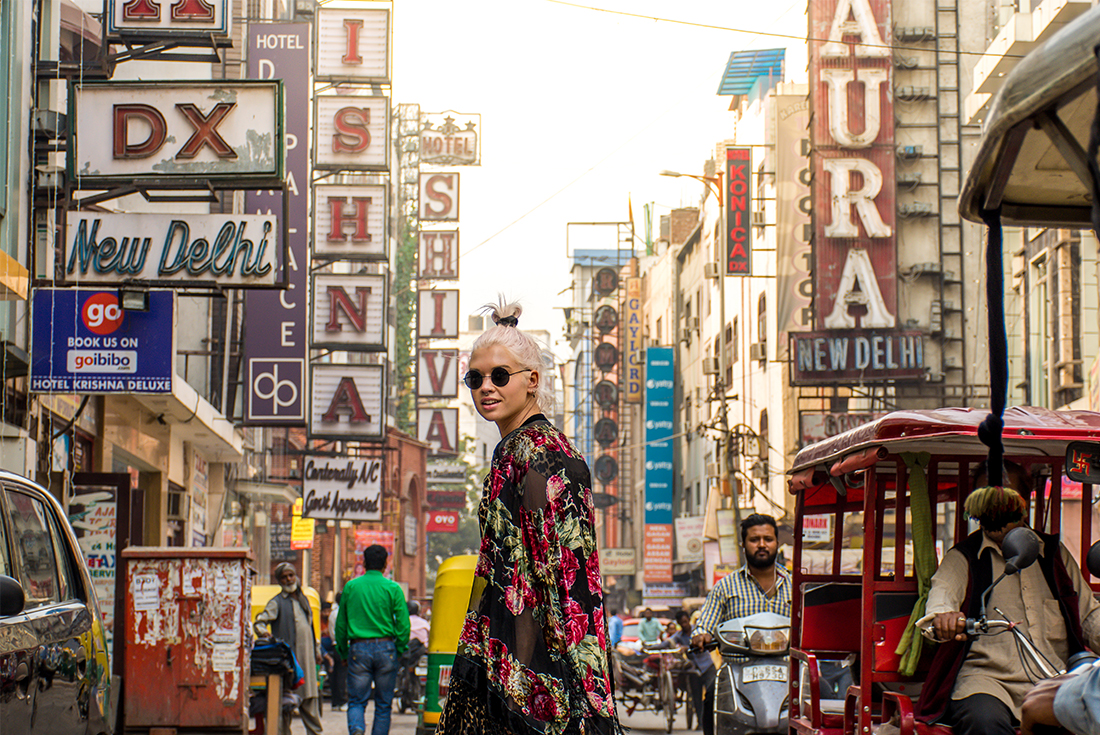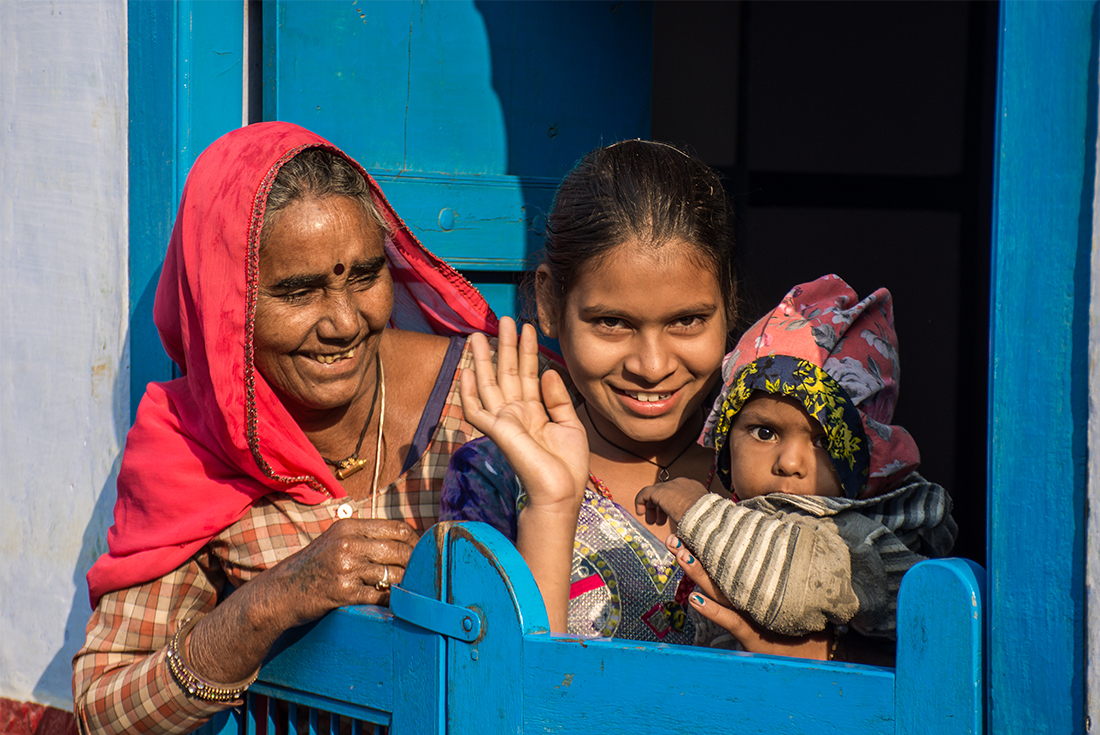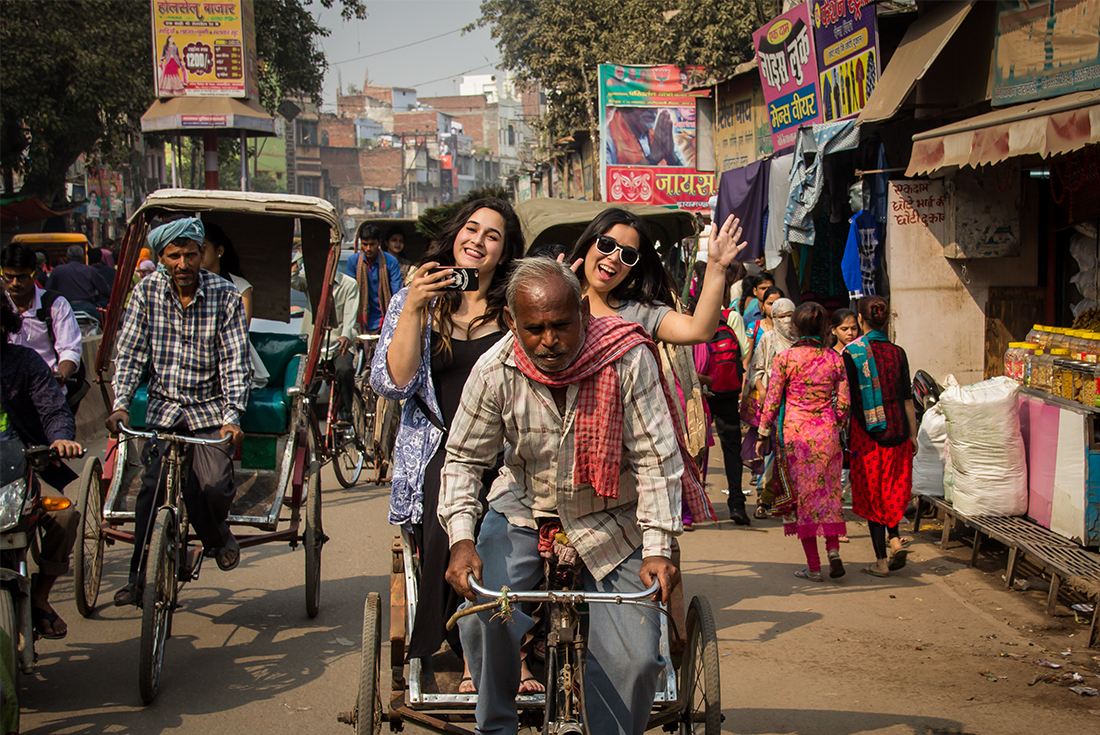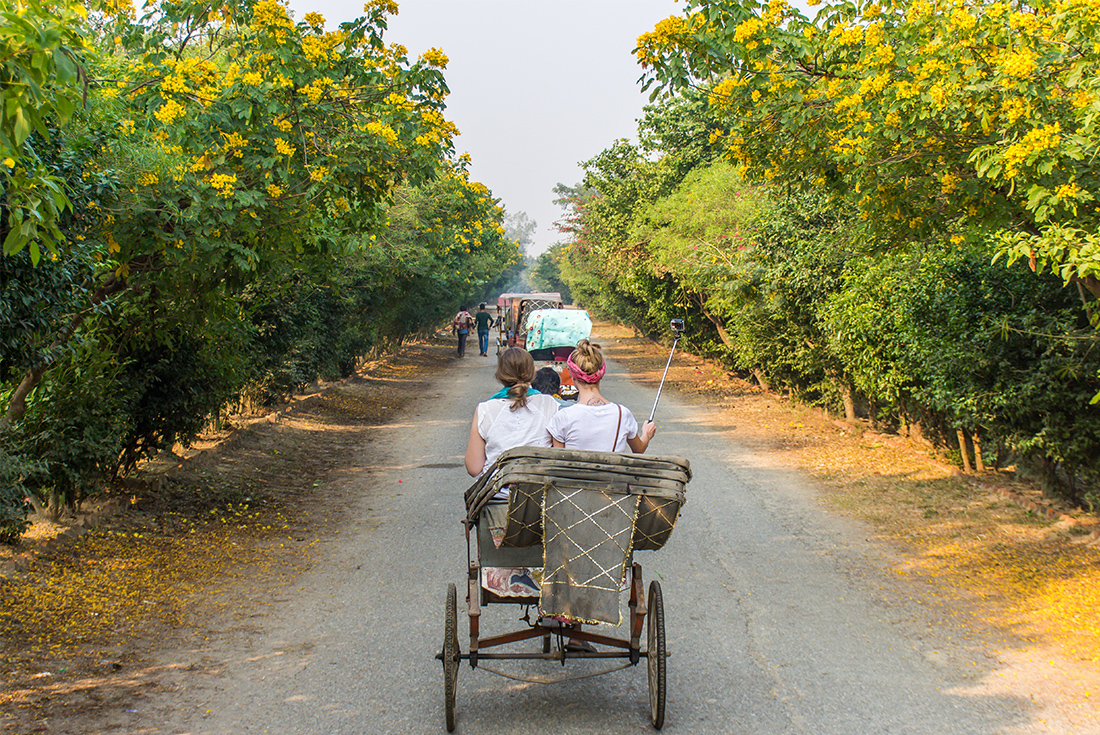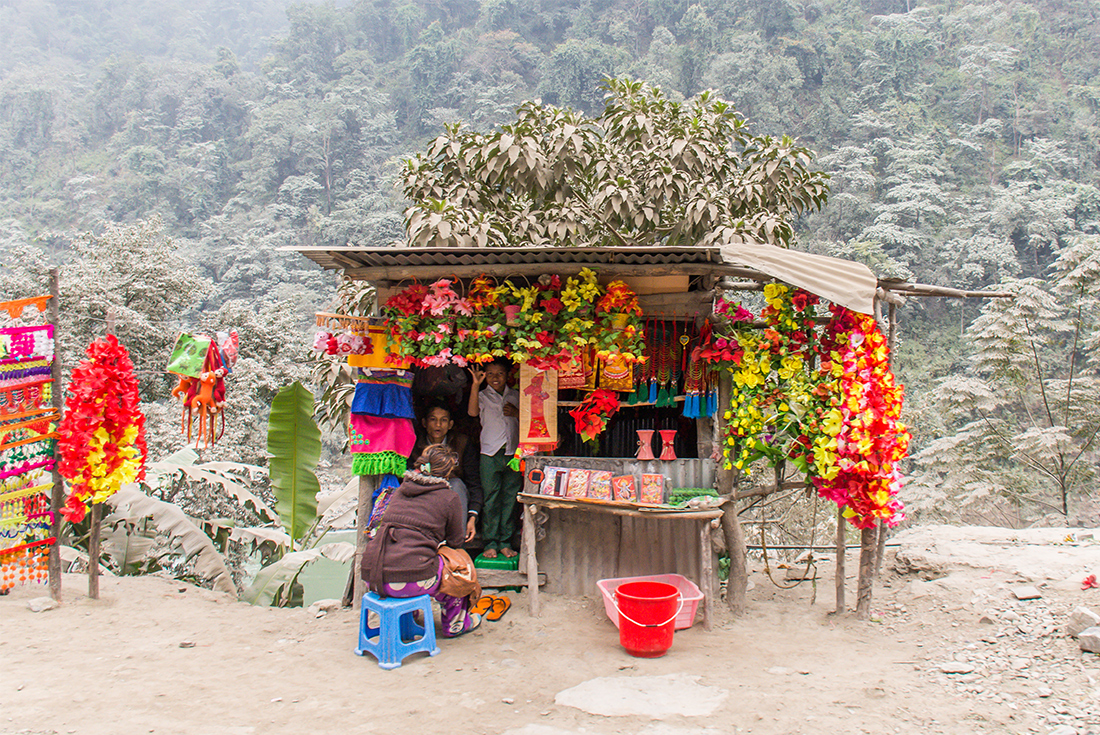- Spot Rhino's and other exotic wildlife in Chitwan National Park, one of the best places to view wildlife in all of Asia.
- Set out on an awesome three-day, low-altitude trek through villages and rhododendron forests, taking in the amazing sights of the Annapurna ranges.
- Paddle around Phewa Lake surrounded by views of the gargantuan Himalayas in super-zen Pokhara,
- Lumbini is no ordinary town. Visit the birthplace of Gautama Buddha, the founder of Buddhism, and tour its temples and the legendary Ashoka Pillars.
- See pilgrims praying and bathing along the ghats of the sacred Ganges River during an unforgettable sunrise cruise in Varanasi, one of India's holiest cities.
- The Taj Mahal may be one of the most recognisable buildings in the world, but do you know its poetic history? A local expert will fill you in.
- It's hard not to fall in love with the tiny Rajasthani village of Tordi. The locals will feed you and you'll sleep in a 16th-century palace. Oh, and there's some ruined temples and a pretty cool fortress nearby too.
05 Jul 2023
Epic Nepal to India
HHYDC
Validity: 01 Jan 2023 to 31 Dec 2023
Fill up on momos (steamed dumplings) in Kathmandu and get ready for a huge trip. We're talking rafting adventures and beach camps. Hit the Annapurna circuit for a glimpse of the mighty Himalayas. Come face-to-face with rhinos and a host of other exotic wildlife in Chitwan National Park. Get spiritual in Varanasi, see pink in Jaipur and take the ultimate selfie in front of the Taj Mahal. This jam-packed trip covers a bit of everything. We love it, and we think you will too.
Basix
18 to 29s
Overnight sleeper train,Private vehicle,4x4 Safari Vehicle/Jeep,Auto rickshaw,Cycle rickshaw,Shuttle bus,Train,Canoe,Bike
3
Mandala Heritage Inn
Mandala Street, Thamel
Kathmandu
44600
NEPAL
Phone: +977 15919611
Check In Time is 1400hrs. Transfer can be easily reached to the hotel.
Hotel Perfect
16A/2 WEA Near Karol Bagh Metro Station
Karol Bagh
Delhi
110005
INDIA
Phone: +91 1142502295
Located in the intriguing Karol Bagh market area, surrounded by a mix of local stalls, shops and restaurants, as well as some western shops. It is only a 25 minutes ride by auto rickshaw (INR70-80 with bargaining) to get to the heart of Delhi, Connaught Place. The hotel features a restaurant and room service, and rooms are equipped with AC, TV & phone. Luggage storage and safe deposit facilities are also available at the hotel. www.hotelperfect.co.in
A pre-booked departure transfer to the airport is available if arranged at the time of booking. Please advise your flight arrival details at least 15 days prior to your trip start date. If you plan to stay longer, this departure transfer can only be offered in conjunction with post-tour accommodation booked through Intrepid. Delhi's Indira Gandhi's International Airport is approximately 25km from Karol Bagh. One of the biggest airports in the world, it can be quite chaotic. A taxi to the airport takes about 1 hour and should cost between 450 -500INR. Hotel reception or your leader can help you arrange a taxi. Before check in you must have your check in luggage x-rayed and sealed. Also ensure at check in that your hand luggage is tagged. (This is a mandatory in order to clear security.) Check-out time from the hotel is 12 noon. If you are departing later, you can arrange luggage storage at the hotel.
1. An excellent level of fitness is required for this trip as there are long trekking days in difficult terrain. 2. Altitude does not exceed 1950 metres/6400 feet on this trip. 3. Rafting on the Trisuli River is grade 3+ 4. Please ensure you bring a passport size photo for our Annapurna trek permit application. 5. A sleeping bag is required for this trip. Please bring your own or hire in Kathmandu for a few dollars a day. 6. A single supplement is available if you’d prefer not to share a room on this trip. The single supplement excludes Days 4 and 5 (Tea House) and Days 10 and 14 (Overnight sleeper train) where you will be in shared accommodation and is subject to availability. Please speak to your booking agent for further information. 7. A valid Indian visa is required prior to travel. This trip arrives into India overland from Nepal and e-visas are not valid at land borders. 7. Hot air balloon flights are operated by Sky Waltz in Jaipur. Flights operate from September 1st to April 30th and last approximately 60 mins. Return transfers, tea and coffee plus light refreshments and a certificate of flight are included in the cost. You can register your interest and pay your tour leader at your joining meeting on day 1 of your trip. Payment must be made by cash in either INR/AUD/USD/GBP only and is USD$260pp (subject to change). Flights are subject to availability and weather conditions (tickets are fully refundable in case of bad weather). 8. This trip is a combination of HNYU and HNYD our most popular itineraries. As such the make up of your group and your leader may change on day 7. 9. Please be aware that in the event of an emergency evacuation, Intrepid does not have control over which helicopter service may be used. Some helicopters are not in regular use with Intrepid and have not passed our internal safety auditing.
All group trips are accompanied by one of our group leaders. The aim of the group leader is to take the hassle out of your travels and to help you have the best trip possible. Intrepid endeavours to provide the services of an experienced leader however, due to the seasonality of travel, rare situations may arise where your leader is new to a particular region or training other group leaders. Your leader will provide information on the places you are travelling through, offer suggestions for things to do and see, recommend great local eating venues and introduce you to our local friends. While not being guides in the traditional sense, you can expect them to have a broad general knowledge of the places visited on the trip, including historical, cultural, religious, and social aspects. At Intrepid we aim to support local guides who have specialised knowledge of the regions we visit. If you are interested in delving deeper into the local culture at a specific site or location then your leader can recommend a local guide service in most of the main destinations of your trip.
Most national governments provide regularly updated foreign travel advice on safety issues involved with international travel. We recommend that you check your government's advice for their latest travel information before departure and ensure that your travel insurance covers you for all destinations and activities on your trip. Please refer to our website's safety page for links to major travel advisories and updates on safety issues affecting our trips here: https://www.intrepidtravel.com/travel-alerts We strongly recommend the use of a neck wallet or money belt while travelling, for the safe-keeping of your passport, flight tickets, cash and other valuable items. Leave your jewellery at home - you won't need it while travelling. Many of our hotels have safety deposit boxes, which is the most secure way of storing your valuables. A lock is recommended for securing your luggage. Your leader will accompany you on all included activities, however, during your trip you'll have some free time to pursue your own interests or relax and take it easy. While your leader will assist you with the available options in a given location, please note that any optional activities you undertake are not part of your Intrepid itinerary, and Intrepid makes no representations about the safety of the activity or the standard of the operators running them. Please use your own good judgement when selecting an activity in your free time. Please also note that your Leader has the authority to amend or cancel any part of the trip itinerary if it's deemed necessary due to safety concerns. Intrepid's operational safety policies can be viewed on our website at the link below. We recommend that you take a moment to read through this information before travelling, and would appreciate any feedback on how safety is being managed on our trips.
https://www.intrepidtravel.com/safety-guidelines
FIRE PRECAUTIONS: Please be aware that local laws governing tourism facilities in this region differ from those in your home country and not all the accommodation which we use has a fire exit, fire extinguishers or smoke alarms.
TRAFFIC AND DRIVING ON THE OTHER SIDE OF THE ROAD: Depending on where you come from please note that drivers in this part of the world may drive on the opposite side of the road from what you are used to. Look both ways before crossing any road. Traffic can be a little more chaotic than you might be used to at home. Be aware!
PETTY THEFT AND PERSONAL SAFETY While travelling there is always the risk of pick-pocketing and petty theft, particularly in the more touristy cities. We recommend that you exercise caution when walking alone at night and encourage you to walk together and only on main, well-lit thoroughfares. Be particularly vigilant on public transport. Simple measures like carrying your day pack on your front, not hanging your bag over the back of your chair or on the floor and wearing a money belt will reduce any chance that your valuables should go missing.
SEAT BELTS: Please be aware that local laws governing transportation safety may differ from those in your home country and not all the transport which we use is able to provide seat belts.
LIFE JACKETS: While life jackets are generally available on water craft, there may be occasions where they are not provided and child size life jackets are not always readily available. If travelling with children and this safety issue concerns you we will be able to advise alternative methods of transport (where available) for you to travel to the next destination. You can choose to travel independently for this leg of the journey. This would be at your own expense.
WIFI: Hotels in Kathmandu generally have excellent WiFi connections. Most hotels offer free WiFi in public areas, with some also offering in-room WIFI, sometimes for an additional fee. While trekking WiFi may be available in tea houses and lodges for a small cost. The higher you go the more the use of WiFi and the internet will cost, and likely the slower the speed. Your tour leader will be able to offer some advice on communications in remote areas of the country. Please note that most teahouses do not have electrical outlets in rooms to charge devices but are shared in the main dining area, for an additional fee. Past travellers have found portable solar chargers to be very useful. WIFI Generally, WiFi is available in most parts of India and at most of the accommodation we use. It's usually free in public areas of hotels but some properties will charge for in-room use. Please ask your tour leader or the specific hotel reception upon check-in. Many restaurants and cafes (especially in tourist areas) offer customers free WiFi. Ask for the password when ordering. Internet cafes are widespread in India and connections are usually reasonably fast, except in more remote areas. MOBILE You can purchase a SIM at the airport (or at kiosks everywhere) for use while travelling in India. Airtel or Vodaphone is a good bet. SIMs are relatively cheap. You will need to usually provide 2 passport-sized photos and a copy of your passport will be made. MAIL Posting airmail letters to anywhere overseas costs ₹25/15. International airmail postcards cost around ₹12. For postcards, stick the stamps on before writing, as the post office can give you as many as four stamps per card. The post office is always a fun adventure in India!
PASSPORT You’ll need a valid passport to travel internationally and most countries require your passport to have a minimum of 6 months validity, so remember to check the expiry date. We need your passport information to get everything ready for your trip so it’s important that the information on your booking matches your passport exactly. Please take care to provide the correct details. We recommend carrying a copy of the photo page of your passport while travelling and leaving a copy at home with family or friends. VISAS Many countries require a visa and obtaining the correct visa is your responsibility. We recommend you check your visa requirements as soon as you have booked your trip. This will ensure you have time to prepare your documents and for your visa application to be processed. Entry requirements can change and are different depending on your nationality. Please refer to your government's foreign travel advisories, the consular websites for the countries you’re travelling to and those you may transit through. Always follow visa advice from official websites; not all visa information found online may be valid. You can also head to Intrepid’s Entry & Health requirement page to get the latest information on travel documents and visa requirements, plus local government COVID-19 vaccination and quarantine policies: https://www.intrepidtravel.com/au/visa-health-requirements NEPAL: All foreign nationals (except Indian passport holders) require a visa to enter Nepal. Visas are obtainable from embassies abroad, land borders (including borders with India & Tibet), and on arrival at Kathmandu's Tribhuvan Airport. Please note that visa on arrival is only available to fully vaccinated visitors and those who are not fully vaccinated will require a recommendation letter from a Nepal travel agency and will need to go through 10-day quarantine on arrival. Getting a visa at the airport or land borders can sometimes take time due to long queues. There have been instances when travellers are asked to show proof of exit from the country, ie flight tickets. You may also need to provide two passport photos and the following fees in US dollars (subject to change, cash only). Other currencies are also accepted although rates may differ. The following costs were correct at time of writing: - Multi entry visa valid for 15 days - US$30 - Multi entry visa valid for 30 days - US$50 - Multi entry visa valid for 90 days - US$125 Your visa application form may require you to state the dates on which you enter and exit that country. Please note we suggest you list your date of entry a few days before, and date of exit a few days after your intended dates in case you encounter any delays or problems en route. To help calculate the exact dates of these crossings we have found the website www.timeanddate.com to be very useful. Nepal Covid-19 Entry Requirement For the latest update of what is required in order to enter Nepal, please check your government's foreign travel advice and also visit the following website:https://uploads.mwp.mprod.getusinfo.com/uploads/sites/27/2021/09/nepal-traveler-information-sheet.jpg Visas are the responsibility of the individual traveller. Entry requirements can change at any time, so it's important that you check for the latest information. Please visit the relevant consular website of the country or countries you’re visiting for detailed and up-to-date visa information specific to your nationality. Your consultant will also be happy to point you in the right direction with acquiring visas. Visas can take several weeks to process, so familiarise yourself with any requirements as soon as you have booked your trip to allow for processing time. INDIA: - Please note that travellers entering India overland from Nepal are required to apply for a visa in advance their home country. Visas will not be issued on the Nepal/Indian border. The E-Tourist Visa DOES NOT apply to travellers entering India overland. Please check your trip notes if you are crossing a border between India and Nepal. - Please be aware of strict conditions regarding application and travel (check under ELIGIBILITY section). - Indian visas are difficult and time consuming to obtain in Nepal. Tourist visas are available in Single and Multiple Entry. Be sure to check the date you require a visa from and the length of time you will need to cover, especially if you change countries during your trip. For your visa application you need to include the following information under the local contact section towards the end of the application. : PEAK India 25/3 East Patel Nagar New Delhi 110008 Phone: +91 11 4500 6400 Please note that this information can change at any time. Please always refer to https://indianvisaonline.gov.in/visa/index.html This is the official visa online site. There have been reports of other non-official websites that travellers should be aware of. Your visa application form may require you to state the dates on which you enter and exit that country. Please note we suggest you list your date of entry a few days before, and date of exit a few days after, your intended dates in case you encounter any delays or problems en route. The following are the international / administrative border crossings for this trip: Day 12 - Exit Nepal at Bhairahawa and enter India at Sunauli To help calculate the exact dates of these crossings we have found the following website to be very useful: www.timeanddate.com INDIA: An E-Tourist Visa (eVT) visa is available for selected nationalities. Please follow the instructions at https://indianvisaonline.gov.in/evisa/tvoa.html and complete the application for your eVT. This needs to be completed no less than 4 days prior to arrival. This is the only official visa online site. There are many other mirror sites that are run by visa service companies or scammers and may not be reliable. Visa requirements for Canada, US and UK customers have changed. Please check your government's foreign travel advisories along with the consular website for India for the most up to date information specific to your nationality and circumstances. The E-Tourist Visa does not apply to travellers entering India overland. Please check your trip notes if you are crossing a border between India and Nepal, noting that Indian visas are difficult and time-consuming to obtain in Nepal. Tourist visas are available in Single and Multiple Entry. Be sure to check the date you require a visa from and the length of time you will need to cover, especially if you change countries during your trip. The following local contact information can be used for your visa application, where relevant: Intrepid India 25/3 East Patel Nagar Delhi 110008 Phone: +91 11 4500 6400
Spot Rhino's and other exotic wildlife in Chitwan National Park, one of the best places to view wildlife in all of Asia.
Set out on an awesome three-day, low-altitude trek through villages and rhododendron forests, taking in the amazing sights of the Annapurna ranges.
Paddle around Phewa Lake surrounded by views of the gargantuan Himalayas in super-zen Pokhara,
Lumbini is no ordinary town. Visit the birthplace of Gautama Buddha, the founder of Buddhism, and tour its temples and the legendary Ashoka Pillars.
See pilgrims praying and bathing along the ghats of the sacred Ganges River during an unforgettable sunrise cruise in Varanasi, one of India's holiest cities.
The Taj Mahal may be one of the most recognisable buildings in the world, but do you know its poetic history? A local expert will fill you in.
It's hard not to fall in love with the tiny Rajasthani village of Tordi. The locals will feed you and you'll sleep in a 16th-century palace. Oh, and there's some ruined temples and a pretty cool fortress nearby too.
You must have a pre purchased Indian visa in your passport for this trip. Indian visa is required prior to travel and cannot be purchased at border on Day 12 of the trip. Indian e-Visas are not valid for this border crossing. The Nepal section of this trip has a trekking component of up to 5 hours a day at a max of 2200 metres/7200 feet. There are several long travelling days, including Kathmandu to Pokhara (7 hours), Lumbini to Varanasi (10 hours), Varanasi to Agra (12 hours).
GENERAL HEALTH All travellers need to be in good physical health in order to participate fully on this trip. When selecting your trip please make sure you have read through the itinerary carefully and assess your ability to manage and enjoy our style of travel. Please note that if in the opinion of our group leader or local guide any traveller is unable to complete the itinerary without undue risk to themselves and/or the rest of the group, we reserve the right to exclude them from all or part of a trip without refund. You should consult your doctor for up-to-date medical travel information or for any necessary vaccinations before departure. We recommend that you carry a first aid kit as well as any personal medical requirements in their original packaging as they may not easily be obtained while travelling. COVID-19 The safety and wellbeing of our travellers, leaders, crew, staff, and suppliers continues to remain our highest priority as we travel. You can read more about how we will keep you safe on our trips, including our COVID-19 Health & Safety Guidelines here: https://www.intrepidtravel.com/safe-travels VACCINATION POLICY From 1 January 2023, Intrepid will no longer require travellers to provide proof of vaccination against COVID-19 for this trip. However, we continue to strongly recommend that all travellers get vaccinated to protect themselves and others. Specific proof of testing or vaccination may still be required by your destination or airline. Please ensure you check travel and entry requirements carefully. For more information, including a detailed FAQ about this policy, please visit https://www.intrepidtravel.com/covid19. HEALTH SCREENING If you are unwell prior to travelling, please stay at home and contact us to make alternative arrangements. From 1 January 2023, Intrepid will no longer require travellers to complete a self-screening health form at the group meeting for this trip. If you are displaying any COVID-19 symptoms or have any health concerns during the trip, we will follow the advice of local health authorities to determine whether medical assistance, isolation or further action is required. Travellers who test positive while taking part in an Intrepid trip will need to leave the group for a minimum of five days and may only rejoin the group if presenting as asymptomatic – our team will assist them in arranging a place to self-isolate and any onward journey. It's quite possible that the destination country may have different or more strict protocols than your home country regarding COVID-19. This may include hotel or hospital quarantine or quarantine for the group. Please check your government's travel advice or contact the closest embassies to find out the details. We ask all travellers to continue to monitor their health throughout their travels and report any relevant symptoms to their tour leader. MOSQUITO-BORNE ILLNESSES: Malaria is a risk in many parts of India, including major cities. Cases of dengue fever are reported, especially in the period after the monsoon. Other mosquito-borne diseases (including Japanese encephalitis, chikungunya fever, and filariasis) also occur. Take preventative measures such as wearing long clothing, using repellent, and being indoors particularly around dusk and dawn. Consult a medical professional regarding prophylaxis against malaria. For more information, see the World Health Organisation's fact sheets: http://www.who.int/neglected_diseases/vector_ecology/mosquito-borne-diseases/en/ AIR POLLUTION: During winter months (October-February), air pollution levels in parts of India can spike to hazardous levels. Severe pollution can increase the risk of respiratory problems. Those with pre-existing medical conditions, particularly heart and lung conditions, may be especially affected. Your leader can assist you to obtain a face mask if required. All customers are encouraged to pack (reusable) face masks as a precaution. OTHER INFECTIOUS DISEASES: Water-borne, food-borne, parasitic and other infectious diseases (including meningitis, cholera, typhoid, hepatitis, tuberculosis, diphtheria and rabies) are common in India. Tap water is not safe to drink. Home-made or unlabelled alcohol can be poisonous. Seek medical attention if you suspect food poisoning, if you have a fever or suffer from diarrhea. ZIKA VIRUS: India is classified as an ongoing transmission zone for Zika, with confirmed cases in Tamil Nadu and Jaipur. Basic precautions for protection from mosquito bites should be taken by people traveling to Zika transmission areas, especially pregnant women. INFLUENZA Cases of influenza A(H1N1) are widespread in India during winter with a number of recent cases in Rajasthan. Discuss influenza vaccination requirements with your doctor or a travel health professional before departing and maintain good hygiene practices by covering your mouth and nose with a tissue when coughing, and washing your hands regularly. For more information, see the World Health Organisation's fact sheets: https://www.who.int/news-room/fact-sheets/detail/influenza-(seasonal)
While travelling with us you'll experience the vast array of wonderful food available in the world. Your group leader will be able to suggest restaurants to try during your trip. On our camping trips we often cook the region's specialities so you don't miss out. To give you the maximum flexibility in deciding where, what and with whom to eat, generally not all meals are included in the trip price. This also gives you more budgeting flexibility. As a rule our groups tend to eat together to enable you to taste a larger variety of dishes and enjoy each other's company. There's no obligation to do this though. FOOD IN NEPAL: In Kathmandu and Pokhara there are plenty of restaurants and cafes for all tastes and budgets. For a glimpse at what traditional Nepali cuisine entails, check out our guide here: https://www.intrepidtravel.com/adventures/guide-to-nepali-cuisine/ Nepal caters very well towards vegetarians and vegans with almost all restaurants having a veg section of the menu. Your tour leader will be able to direct you towards restaurants that are known to have better hygiene, especially in tourist areas where they are travelling with our groups regularly. FOOD IN INDIA: Food is a way of life in India. You can snack for a bargain or dine in the finest Indian restaurants. Generally, you can eat very cheaply in India. There is a huge choice of restaurants and street stalls serving traditional and local Indian food. In bigger restaurants in areas frequented by more tourists, there is a choice between Indian, Chinese and Western-style food. Here are some ideas of what to try: https://www.intrepidtravel.com/adventures/best-food-in-india/ https://www.intrepidtravel.com/adventures/foodies-guide-south-india/ Please note that service in restaurants (especially with a group) can be quite slow so patience is a must. India caters very well towards vegetarians and vegans with almost all restaurants having a veg and pure veg section of the menu. If in doubt please check with your tour leader. See our guide to eating vegan in India here: https://www.intrepidtravel.com/adventures/india-vegan-food-guide/ Your tour leader will be able to direct you towards restaurants that are known to have better hygiene, especially in tourist areas where they are travelling with our groups regularly. For some more advice on avoiding "Delhi belly", see our article here: https://www.intrepidtravel.com/adventures/how-to-avoid-delhi-belly-in-india/
NEPAL: The official currency of Nepal is the Nepali rupee (NPR). Its symbol is often displayed as Rs. USD is also widely accepted in Nepal. ATMs can only be found in Kathmandu, Pokhara, and Bhaktapur. Make sure you carry sufficient cash to cover your needs when travelling outside of these cities. Money exchange facilities are available in Kathmandu, Namche, Pokhara, Chitwan (only outside the park), and Bhaktapur. Credit cards are not widely accepted. The Government of Nepal has banned the import, export, and use of 500 and 1000 Indian rupee notes in Nepal. You should ensure you are not carrying these notes on arrival in Nepal as they will be confiscated and you may be fined. Please note that most establishments in Asia will not accept foreign currency notes that are old, torn, or faded and they can be very difficult to exchange or extra fees added when exchanging at banks. Please ensure that you have new, clean notes. Before departing on a trek, make sure you have enough Nepalese currency to purchase meals and drinks, in the smaller denominations where possible, as there are no ATMs and larger notes (such as 1000R) can be difficult to change. Nepali Rupee is a blocked currency – it cannot be exchanged into other currencies outside of Nepal. You can only obtain Nepali Rupee in Nepal and must exchange any leftover Nepali Rupee whilst still in Nepal. The official currency of India is the Indian Rupee (INR). Its symbol is ₹. The most convenient and cheapest way to obtain local currency in is via ATMs, which are readily available in most towns. Look for Bank of India or ICICI ATMs. Our experience has shown they are the most reliable ATMs to use for withdrawals. Cash shortages at ATMs can be a problem in rural areas. Foreign currency notes that are old, torn, or faded can be very difficult to exchange, so please bring clean bills, and small denominations are most useful. The use of credit cards can be restricted, mainly to major hotels, shops, and higher-end establishments. SPENDING MONEY When it comes to spending money on the trip, every traveller is a little different. You know your spending habits better than we do, so please budget an appropriate amount for things like optional meals, drinks, shopping, optional activities, and laundry. Make sure you have read the itinerary and inclusions thoroughly so you know what is included in the trip price and what you may need to pay for while travelling. CONTINGENCY FUNDS We try to plan for every eventuality, but there are still some things beyond our control. We reserve the right to change an itinerary after departure due to local circumstances or a Force Majeure Event. In such emergency circumstances, the additional cost of any necessary itinerary alterations will be covered by you. Please note we are not responsible for any incidental expenses that may be incurred as a result of the change of itineraries including but not limited to visas, vaccinations or non-refundable flights. Make sure you have access to an extra US$500 for emergencies (e.g. severe weather, natural disasters, civil unrest) or other events that result in unavoidable changes to the itinerary (e.g. transport strikes or cancellations, airport closures). Sometimes these things necessitate last-minute changes to enable our trips to continue to run, and as a result, there may be some extra costs involved. The recommended amount is listed in USD for the relatability of universal travellers, however, local currency may be needed once in the country to cover these costs. Optional tipping kitty for this trip: 2000 INR per person TIPPING If you're happy with the services provided a tip - though not compulsory - is appropriate. While it may not be customary to you, it's of great significance to the people who will take care of you during your travels, inspires excellent service, and is an entrenched feature of the tourism industry across many Intrepid destinations. Your Tour Leader: You may consider tipping your tour leader for outstanding service throughout your trip. The amount is entirely a personal preference, however as a guideline US$3-US$5 per person (in local currency), per day can be used. Of course, you are free to tip more or less as you see fit, depending on your perception of service quality and the length of your trip. Remember, a tip is not compulsory and should only be given when you receive excellent service. Please don't tip with coins, very small denomination notes, or dirty and ripped notes. This is regarded culturally as an insult Commissions: The receipt of commissions or kickbacks in exchange for recommending particular shops or services is ingrained in the culture of the tourism industry. Rather than turning a blind eye to this unavoidable issue in some areas, we have established a centralised fund whereby contributions from recommended suppliers are collected and distributed back into the business. We aim to provide the best value trips in the market, and this fund assists in keeping operating costs and trip prices low to you. A priority in establishing this fund is that the experience of our traveller - you - is not compromised in any way. Please let us know via the feedback form completed after your trip if we are successfully meeting this objective. Optional Tipping Kitty: On Day 1 your tour leader will discuss with you the idea of running a group tipping kitty, whereby everybody contributes an equal amount and then your tour leader pays the tips for drivers, local guides, and hotel staff (excludes restaurant tips). The leader will keep a running record of all monies spent which can be checked at any time, and any money remaining at the end of the tour returned to group members. This is often the easiest way to avoid the hassles of needing small change and knowing when and what is an appropriate amount to tip. Participation in this kitty at your own discretion, and you are welcome to manage your own tipping separately if you prefer. Please note the tipping kitty excludes tips for your tour leader.
https://www.intrepidtravel.com/packing-list
MAIN LUGGAGE What you need to bring will vary according to when you are travelling. Generally speaking, we recommend you pack as lightly as possible and make sure that you are able to carry and lift your own luggage, and walk with it for short distances including up and down stairs and in busy train stations. Our travellers usually find the smaller their luggage is, the more they enjoy the trip not having to worry about carrying heavy bags! Aim to keep your main luggage under 15kg. Small, wheeled suitcases that can also easily be picked up and carried are the best for travel in this part of the world, although if you prefer, a back pack is also fine. If you are taking overnight trains, or primarily using public transport then the smaller your luggage the easier it will be to store under or above bunks. DAY PACK A day pack for carrying essentials when exploring destinations as well as for short overnight stays will be useful. On overnight trains packing this with the essentials you need to access during the trip will also be very useful. Below are some ideas and helpful tips on what you specifically need for this trip. ESSENTIALS: - Lightweight clothing. A mixture of lightweight clothing and warm layers. Clothes should be easy to wash and dry. Maybe bring a change of smart clothes for dinner in bigger cities. Clothing that covers arms and pants/skirts that go past the knee for entry into local temples. - Closed-in shoes (to protect from cuts/scratches/insect bites on city and countryside walks) - Sun protection - hat, sunscreen, sunglasses RECOMMENDED: - India and Nepal can get very cold (ie. below zero!) during winter (Dec to Feb). Many hotels in India do not have central heating. a good quality down jacket and layers are recommended at this time of year. - Personal medical kit, we recommend you carry items such as mild pain killers, electrolytes, Band-Aids and insect repellent. - Water bottle. At least 1.5litre capacity. The sale of bottled water contributes to an enormous environmental problem around the world. A large proportion end up in limited landfill or discarded in waterways and natural environments. - Camera with spare batteries. Our trips have access to power to recharge batteries for phones and cameras most days but we recommend you take a spare battery for your camera. - A small chain and padlock for overnight trains is handy to keep your luggage safe and secure. OPTIONAL: - Sleeping bag. Useful for camping, overnight trains and poorly heated hotels, during the winter months of Dec - Feb - Sleep sheet. - Ear plugs/eye mask - A good book, a journal and music player - Binoculars for spotting wildlife OTHER USEFUL THINGS TO TAKE - reusable shopping bag for buying supplies for long journeys - slippers or flip flops - torch/flashlight - travel wipes - small towel - head scarf for women (for when entering temples or mosques) OTHER THINGS TO CONSIDER - check weather in destinations you are travelling to online a few days before you go to make sure you pack appropriate clothing - laundry facilities may not be available in all destinations, so make sure you have a few cycles of clothes to tide you over until your next chance to wash VALUABLES: Please try to avoid bringing unnecessary valuables, and use your hotel safe. It’s also a good idea to purchase a money belt or pouch that is easily hidden. We strongly recommend that you photocopy/scan all important documents e.g. air tickets, passport, vaccination certificate, etc. and keep the copies separate from the originals. MORE! If you need some further tips for packing, you can always check out our ultimate packing list.
SEASONAL INFORMATION: Nepal's climate varies greatly depending on the season: JUN - SEP: the monsoon rains (mostly at night) bring landslides in regional areas. Cloud cover often obscures mountain views with rain, mud, and leeches deterring most trekkers at this time of year. Treks running in September can be hot and very humid at lower altitudes. See what it's like to trek during monsoon here: https://www.intrepidtravel.com/adventures/nepal-during-monsoon-season/ MAR-APR: Spring brings warm weather and spectacular rhododendron blooms. A popular time to visit and one of the peak times to trek. OCT - NOV: Clear skies and warm days make autumn the peak season. DEC - FEB: Winter brings cold temperatures and snow to the mountains. Good trekking, but remember to rug up. Some towns, including Kathmandu, experience very high levels of seasonal smog which can lead to decreased scenic visibility. WEATHER IN INDIA Due to India's size and topography, there's a huge amount of variation in its climate. We recommend you consider both the season and the part of India you intend to visit, so that you can best pack for your adventure. One of the most beneficial times to visit India is from September to March when temperatures are at their best, with warm days and cool nights. During winter (December to January), temperatures can get quite cold in Delhi and the north, especially at night. Hotels in some regions may not have adequate heating. In these months you may like to bring thermals for sleeping and a warm jacket for mornings and evenings. Fog can delay trains travelling throughout this region. Monsoon is from May to October and offers hot and humid conditions. It is not unusual for trains to be delayed, and for activities in towns near rivers and lakes (ie Varanasi) to require amendment at this time of year. Your leader will be able to advise you locally on any changes. WEATHER CONDITIONS: Please check online for predicted weather conditions for your trip before your departure to ensure that you have packed appropriate clothing. Winter in India can be colder than you might expect and as this is not peak travel season hotels in some regions may not have adequate heating. In these months you may like to bring thermals for sleeping. FREE TIME IN DELHI: Please note that due to train arrival times there may not be any free time in Delhi at the end of this tour. We advise booking additional accommodation to extend your stay.
We like to think our Intrepid travellers are all connected by a love of adventure and passion for seeing the world in a different way. We've laid down a few non-negotiable rules to ensure everyone feels connected, comfortable and safe on our trips. We ask that you respect your fellow travellers, group leader, and local people and places we visit in all circumstances. We don't tolerate any forms of violence and expect that you follow the local laws, customs and regulations in any destination we travel to. Any behaviour contrary to the above, including any behaviour that prevents our staff from performing their duty of care or continuing the itinerary as planned, may result in travellers being removed from the trip. If you consume alcohol while travelling, we encourage responsible drinking and expect you to abide by local alcohol laws. To ensure the well-being of everyone on the trip, all decisions made by group leaders and ground staff are final. Romantic relationships between travellers and group leaders are not permitted while on trip. By travelling with us, you agree to comply with these rules and the laws and customs of all countries visited. If something is concerning you during your travels with us, please speak to your group leader or local guide immediately. Alternatively, contact us on the emergency contact number detailed in your Essential Trip Information’s Problems and Emergency Contact section.
After your travels, we want to hear from you! We rely on your feedback. We read it carefully. Feedback helps us understand what we are doing well and what we could be doing better. It allows us to make improvements for future travellers. http://www.intrepidtravel.com/feedback/
While we always endeavour to provide the best possible holiday experience, due to the nature of travel and the areas we visit sometimes things can and do go wrong. Should any issue occur while you are on your trip, it is imperative that you discuss this with your group leader or our local representative straight away so that they can do their best to rectify the problem and save any potential negative impact on the rest of your trip. We recognise that there may be times when your group leader/local partner may not be able to resolve a situation to your satisfaction - if this is the case, please ask the leader to speak to their direct manager. You may also choose to provide details in your online feedback, which we ask you to complete within 30 days of the end of your trip. Please do be aware that it is very difficult for us to provide any practical help after the trip is completed, so informing us while still travelling will give us the opportunity to resolve the issue in real-time. For general contact details please use the following page: http://www.intrepidtravel.com/ourtrips/contact/ In case of a genuine crisis or emergency, you can reach our local office on the number below: If anyone misses departure then please contact the below: Trip Starting in Delhi: + 91 – 9911972636 Trip Starting in Mumbai: + 91 – 9320177491 Trip Starting in South India: + 91 – 9746479660 EMERGENCY NUMBER: +91 9 999 005 019 Intrepid’s Local Operator: +977 980 112 3617
Our Responsible Travel Policy outlines our commitment to preserving the environment, supporting local communities, protecting the vulnerable, and giving back to the places we travel. All our trip leaders, suppliers, and staff are trained on these principles and are core to us delivering sustainable, experience-rich travel. Explore the different parts of our Responsible Travel Policy by visiting: https://www.intrepidtravel.com/responsible-travel http://www.intrepidtravel.com/ourtrips/rt/responsibletraveller ELEPHANT PERFORMANCES & ELEPHANT RIDING: While we respect each individual’s decisions while travelling, Intrepid does not include elephant rides or unnatural performance activities on any itinerary, and we recommend you bypass these activities should they be offered to you during your stay. Professional wildlife conservation and animal welfare organisations, including World Animal Protection, advise that contrary to common belief, captive elephants remain wild animals and despite good intentions, unfortunately, many venues are unable to provide the appropriate living conditions elephants require and this ultimately impacts their well-being. While there is some merit in the argument that the money you pay for the activity goes towards keeping the elephants and their mahouts employed, we know that it also fuels demand for elephants to be captured in the wild or captive-bred. We thank you for your support in improving the welfare of these majestic creatures. Further information is available on the below link: http://www.intrepidtravel.com/elephants-welfare
We created our not-for-profit, the Intrepid Foundation because you – our travellers – told us you wanted to make an even greater impact in the communities you visit. The Foundation works by teaming up with partners around the world so that together we can deliver greater positive impact at scale. Partners are identified by our local staff who live and work in our destinations. They harness their powerful community connections to determine the issues that matter most and select local partners who can deliver real solutions. Since 2002, the Intrepid Foundation has raised more than 12.8 million dollars and supported more than 130 communities worldwide. Now, with almost 40 partners all over the world, your donations are helping to restore forests in Kenya, empower women in Honduras and promote elephant welfare in Laos, to name just a few. By simply being on this trip, Intrepid Travel will make a donation to the Intrepid Foundation on your behalf. If you choose to donate too, 100% of your donations will go directly to our partners on the ground – where they’re needed most. For more information about the Intrepid Foundation, please ask your leader or visit our website: http://www.theintrepidfoundation.org/
ACCOMMODATION: Some of the accommodation along the way is basic or simple, staying in local guesthouses and homestays. Some may have shared bathroom facilities with cold water only. We use a mixture of air-conditioned and non-air-conditioned rooms. Some areas of India experience daily load shedding. This is where the power may be turned off at certain times of the day and usually occurs for a few hours in the early afternoon. Most hotel properties have a restaurant or cafe serving local meals. Many restaurants and hotels do not serve alcohol for religious reasons or due to local laws. SHOWERS: Showers at some hotels only have hot water at peak times (usually morning and evening). Outside of these times, you may need to speak to reception to obtain hot water. ROOM ISSUES: If you have any issues with your room, please speak to the hotel and your tour leader right away rather than your travel agent so that the problem can be addressed without delay. OCCASIONAL ALTERNATIVE ACCOMMODATION The style of accommodation indicated in the day-to-day itinerary is a guideline. On rare occasions, alternative arrangements may need to be made due to the lack of availability of rooms in our usual accommodation. A similar standard of accommodation will be used in these instances. TWIN SHARE / MULTI SHARE BASIS Accommodation on this trip is on a twin/multishare basis. Please note there may be times where facilities will be shared rather than ensuite and rare occasions when you share a room with passengers travelling on a different Intrepid trip than your own. CHECK-IN TIME Throughout the trip we request that our hotels prepare rooms in time for our arrival, especially if we're arriving prior to normal check-in time. However this isn't always possible which means we won't be able to check-in immediately on arrival at some hotels. Instead, we can store our luggage and explore our new destination. PRE/POST TRIP ACCOMMODATION If you've purchased pre-trip or post-trip accommodation (subject to availability), you may be required to change rooms from your trip accommodation for these extra nights. SLEEPER TRAINS IN INDIA: Sleeper trains are clean and air-conditioned (fan-cooled at times), a great way to travel long distances and still get maximum time in each place. Depending on the route, we travel 2AC or 3AC class as not all classes are available on all routes. Due to the complexity of the ticket purchasing system and high demand for tickets, we are unable to offer upgrades to other classes. Second Class or 2 Tier AC (2AC) carriages have 4 berths in the compartment section and 2 berths in the aisle bay and individual reading lights. Third Class or 3 Tier AC (3AC) has 6 berths in the compartment and 2 in the aisle bay. Both have curtains for privacy. There are no sinks or charging points in these classes. During the day, bunks are folded away and serve as seats. Toilet facilities are located at either end of the carriage. There is usually an Indian style squat toilet at one end and a western-style toilet at the other. You will need your own toilet paper or tissues and cleanliness will depend on the number of people using them. Beds are padded bunks, with sheets, pillow and blanket provided. Some people prefer to bring and use their own sleeping sheet. Your luggage travels with you on the train, so packing light will make your journey more comfortable. Many trains have a dining carriage or a food/snack cart that is brought through the carriages. There are also plenty of vendors selling tea, coffee, water and snacks during the journey, although the hygiene may not be up to standards you are used to at home. Please note you may be sharing with other members of your group or locals on a mixed gender basis. Tickets are booked on a real-name basis using your passport details. We book for all members of the group at the same time, but unfortunately, this is no guarantee that we will be accommodated all together on the train. Your leader will do their best to swap with other travellers to allow people who booked together to travel together, but please be aware that this is not always possible. We may at times ask male travellers to swap with solo female travellers for safety considerations.
TRANSPORT IN INDIA: Main roads in India are usually very busy with an assortment of vehicles from the biggest trucks (who always have right of way) down to bikes (and animals!). Overtaking on blind corners at speed is common as is the total use of the horn as a form of communication. Our leaders have complete authority to remove groups from local transport if the driver is not driving safely. Drivers of our private vehicles are experienced and well trained. if you are uncomfortable with your driver, please always let your tour leader know immediately. Please ensure you wear your seat belt at all times. TRAVEL TIMES: Distances in India do not reflect the driving time and to cover 100km may take much longer than you would expect at home, even if much of the route is on a highway. TRAINS: India has a massive network of trains and millions of people travel by rail every day. Trains often travel the length of the country over several days. Trains are a great way to see the countryside and get you away from the busy road system. Delays and cancellations are common on trains. Your tour leader will check the train status to see if there are delays and will do their best to keep you informed of any changes. From December to February, delays are more common, especially in the north of the country due to fog. It’s not uncommon for trains to be delayed for up to 12 hours. On occasion, your trip will may to be rerouted to allow for these delays. Your tour leader in conjunction with our local office will advise any changes to the itinerary. The Indian Railway system is one of the largest railway networks in the world and quite complex. Seat allocation is completely computerized on a centralized reservation system and we do not have control over seat allocations. Despite booking tickets months in advance of a departure your group's seats, or sleeping berths on overnight trains, maybe spread out within one carriage or multiple carriages of the same class. There’s a chance you’ll be sharing a compartment with local travelers of either gender. For a detailed look into the experience of travelling by overnight trains read more here: https://www.intrepidtravel.com/adventures/india-trains-guide/ AUTO RICKSHAWS: On this trip, we travel on the local style of transport called an auto-rickshaw. These small, motorised three-wheeled vehicles are a common form of transport in India and do not have seatbelts. FLIGHTS: Airlines in India are of excellent quality. Airports are becoming more modern (especially in the major and tourist cities). To enter the airport, you must have a copy of your flight ticket and passport. Schedule changes and delays do occur, especially when weather conditions make visibility poor.
Travel insurance is compulsory on all our trips for those travelling internationally. We require that at a minimum you are covered for medical expenses including emergency repatriation. If you are travelling within your home country or region please confirm before travel that you are entitled to access the public medical system easily should an accident occur. We strongly recommend all travellers have a policy that also covers personal liability, cancellation, curtailment and loss of luggage or personal effects. For international trips, you will not be permitted to join the group until evidence of travel insurance and the insurance company's 24-hour emergency contact number has been sighted by your leader. If you have credit card insurance your group leader will require details of the participating insurer/underwriter, the level of coverage, policy number, and emergency contact number rather than the bank's name and your credit card details. Please contact your bank for these details prior to arriving in-country. For travellers who reside within the European Union, Switzerland or USA the requirement to purchase travel insurance cannot be compulsory. However the purchase of travel insurance is still highly recommended, and travellers from these regions who decline travel insurance when travelling outside of their home region must sign a Travel Insurance Waiver Form at the Group Meeting, recognizing personal responsibility for emergency medical and repatriation costs should they arise. For assistance with travel insurance or other services, please visit the link below: https://www.intrepidtravel.com/booking-resources/our-services
As you travel on a group trip you will be exposed to all the pleasures and maybe some of the frustrations of travelling in a group. Your fellow travellers will probably come from all corners of the world and likely a range of age groups too. We ask you to be understanding of the various needs and preferences of your group - patience with your fellow travellers is sometimes required for the benefit of everyone's travel experience. Remember too that you have responsibilities to the group. If you are requested to be at a place at a certain time, ensure that you don't keep the rest of the group waiting. We have found time and time again that the very best trips we operate are those where the dynamics within the group work well - this takes just a little effort on your part. Due to privacy reasons, we are unable to provide you with contact details and any personal information about your fellow travellers booked on your trip prior to departure. SOLO TRAVELLERS The beauty of our style of travel is that it caters to travellers who are travelling solo and who want to meet and share experiences with like-minded people. On our trips rooming is organised on a twin-share basis. We pair up solo travellers with another traveller of the same gender as per the gender marker on each of their passports. As a responsible tour operator, we strive to create a safe and inclusive environment for everyone. In the case that your gender identity differs from what is indicated on your passport, please contact us so that we can discuss rooming options with you. We also have an optional single supplement available on most trips for travellers who prefer to have their own room. Please note that this only applies to accommodation during the tour. Pre-trip and post-trip accommodation booked through us will be on a single room basis. On a small selection of itineraries some accommodations are booked on an open gender, multi-share basis (for example on a felucca in Egypt or an overnight train in Vietnam). In those instances it will clearly be stated in our Essential Trip Information prior to booking and travelling.
ITINERARY CHANGES Our itineraries are updated regularly throughout the year based on customer feedback and to reflect the current situation in each destination. The information included in this Essential Trip Information may therefore differ from when you first booked your trip. It is important that you review this information prior to travel so that you have the latest updates. Due to weather, local conditions, transport schedules, public holidays, or other factors, further changes may be necessary to your itinerary once in-country. The order and timing of included activities in each location may also vary seasonally to ensure our travellers have the best experience. Your tour leader will keep you up to date with any such changes once on tour. OPTIONAL ACTIVITIES A selection of optional activities that have been popular with past travellers are listed in the day-to-day itinerary. This isn't an exhaustive list and should be used as a guide only for some of what might be available. Prices are approximate, are for entrance only, and don’t include transport to and from the sites or local guides unless indicated. All activities are subject to availability, and maybe on a join-in basis. It may not be possible to do all the activities listed in the time available at each destination, so some pre-planning for what you are most interested in is advised. When it's recommended that travellers pre-book these activities, look for a note in the Special Information section of the day-to-day itinerary. For most, they can either be organised independently on the day, or let your leader know you are interested in the Group Meeting and they can assist. Where activities are considered medium or high risk, we work with operators whose safety and credentials we have sighted and assessed. Although it is possible that you may find the same activity cheaper with another operator on the ground, we cannot vouch for the safety or quality of that operator. Medium and high-risk activities not listed above have not been assessed by us and as such our staff and leaders are unable to assist you with organising these activities. Activities that contravene our Responsible Travel policies are also not listed. Please remember that the decision to partake in any activity not listed is at your own discretion and risk.
Hotel (11 nights),Lodge (2 nights),Heritage Property (1 night),Homestay (1 night),Camping (with basic facilities) (1 night),Tea House (2 nights),Sleeper Train (1 night)



